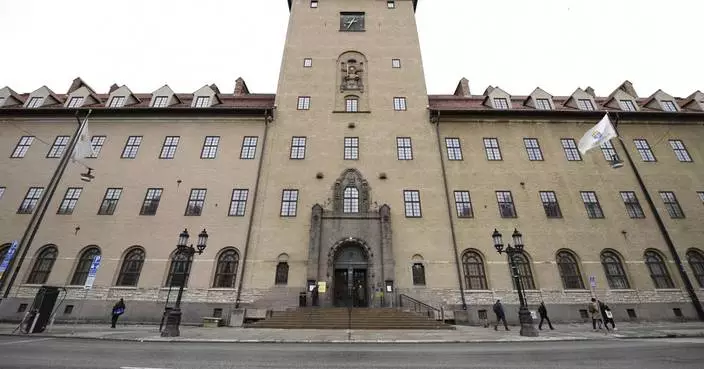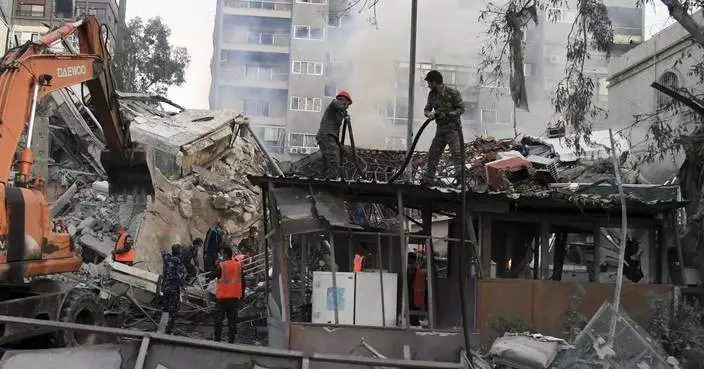Two days after Syrian troops declared Douma liberated from rebel fighters and 10 days since a suspected chemical attack, a tour of the town just east of Damascus on Monday revealed widespread destruction and traumatized residents who recalled months spent cowering in crowded underground shelters infested with lice, with barely any food or water.
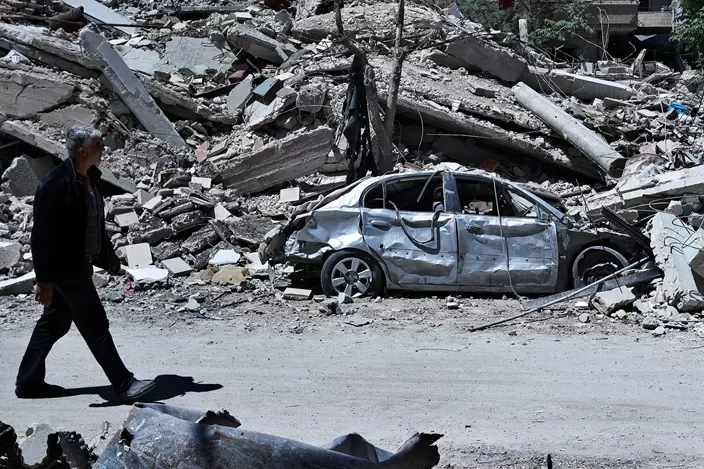
A Syrian man walks by damaged buildings in the town of Douma, the site of a suspected chemical weapons attack, near Damascus, Syria, Monday, April 16, 2018. (AP Photo/Hassan Ammar)
Except for the Russian and Syrian troops patrolling the streets, few people could be seen in Douma, the majority of its residents now displaced to rebel-held areas to the north.
Click to Gallery
Two days after Syrian troops declared Douma liberated from rebel fighters and 10 days since a suspected chemical attack, a tour of the town just east of Damascus on Monday revealed widespread destruction and traumatized residents who recalled months spent cowering in crowded underground shelters infested with lice, with barely any food or water.
Except for the Russian and Syrian troops patrolling the streets, few people could be seen in Douma, the majority of its residents now displaced to rebel-held areas to the north.
Douma was one of the first areas to rise up against President Bashar Assad's government and until a few weeks ago it was a major threat to his seat of power in Damascus, as rebels pelted it with shells, disrupting normal life. On Saturday, Syrian government forces entered Douma for the first time since 2012, marking the biggest victory for Assad's forces since the conflict began in 2011.
On an Associated Press tour of the town, organized by the Assad government, hundreds of men, women and children could be seen standing in long lines waiting their turn to get pasta, vegetables and loaves of bread piled on government trucks and handed out for free.
"Our happiness is double now. We are eating wheat bread and we sleep without fear," said tailor Alaa Khobiyeh. "Most importantly, we sleep above ground not underground."
Residents also spoke of several local families who used to buy large amounts of food and hoard it to sell later at a far higher price, making most food products out of reach for most people.
Douma was the scene of a suspected chemical weapons attack on April 7 that killed more than 40 people and hastened the rebels' surrender to government forces. During a government-organized trip Monday, survivors spoke to the AP of the horror they witnessed from a chlorine-like substance that killed their neighbors, but they blamed the rebels for the attack, without providing any evidence.
Hamdan said that initial funding of 5 billion Syrian pounds ($10.8 million) had been set aside "for different domains, and if it is not enough then we are ready to fund more."
The main hospital, courthouse and municipal buildings were largely reduced to rubble, while the nearby Grand Mosque, famed for its towering arches, white dome and majestic palm trees was riddled with bullet and shell holes — testimony to the intense government assault the town was subjected to since being seized by the rebels six years ago.
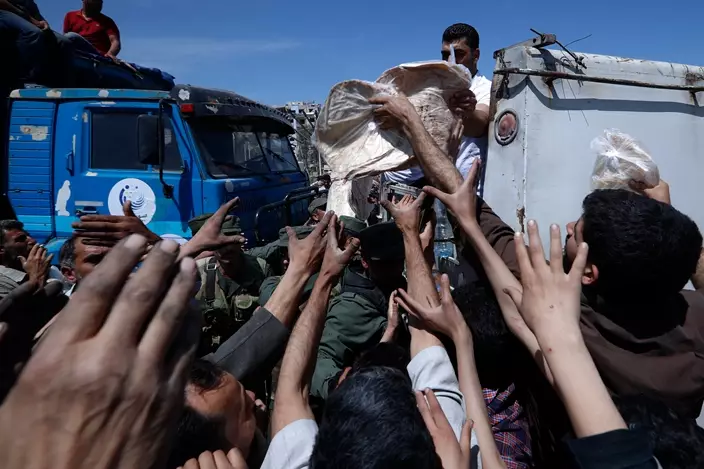
Syrian authorities distribute bread, vegetables and pasta to Douma residents, in the town of Douma, the site of a suspected chemical weapons attack, near Damascus, Syria, Monday, April 16, 2018. (AP Photo/Hassan Ammar)
Douma was one of the first areas to rise up against President Bashar Assad's government and until a few weeks ago it was a major threat to his seat of power in Damascus, as rebels pelted it with shells, disrupting normal life. On Saturday, Syrian government forces entered Douma for the first time since 2012, marking the biggest victory for Assad's forces since the conflict began in 2011.
On Monday, the few remaining residents were able to move around safely for the first time in months following the crushing government offensive and a yearslong siege, tightened even further last year, that had starved the town, once the bread basket of the capital, of food, medical supplies and other essentials.

A Syrian man holds bread as Syrian authorities distributed bread, vegetables and pasta to Douma residents, in the town of Douma, the site of a suspected chemical weapons attack, near Damascus, Syria, Monday, April 16, 2018.(AP Photo/Hassan Ammar)
On an Associated Press tour of the town, organized by the Assad government, hundreds of men, women and children could be seen standing in long lines waiting their turn to get pasta, vegetables and loaves of bread piled on government trucks and handed out for free.
"This is the first time I will eat wheat bread in years," said Naim Saqour, an 18-year-old, after receiving a pack of nine Arab loaves from the government employees. Saqour said that he and his family had survived for months on olives and small amounts of barley bread.
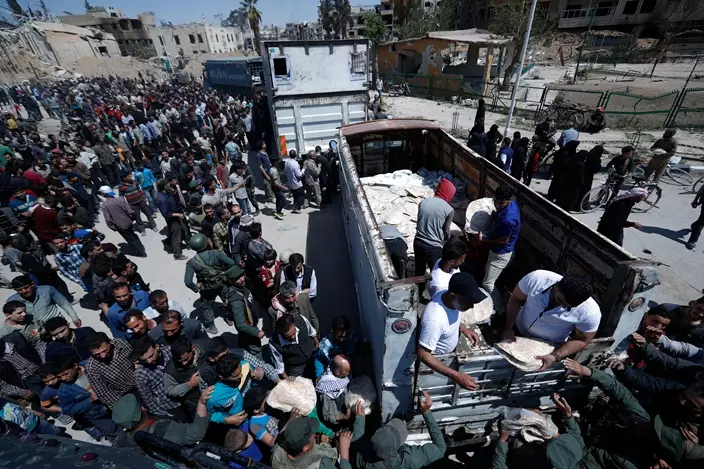
Syrian authorities distribute bread, vegetables and pasta to Douma residents in the town of Douma, the site of a suspected chemical weapons attack, near Damascus, Syria, Monday, April 16, 2018. (AP Photo/Hassan Ammar)
"Our happiness is double now. We are eating wheat bread and we sleep without fear," said tailor Alaa Khobiyeh. "Most importantly, we sleep above ground not underground."
Many residents blamed the greed of some local businessmen and the main rebel group in Douma, the Saudi-backed Army of Islam, for much of their misery, by raising food prices to make more money and hiding the scant food supplies from people in need. After the Army of Islam left town, they said, they discovered the militants had stored large amounts of rice, flour, wheat, canned goods and other food — enough, they said to feed residents for months.
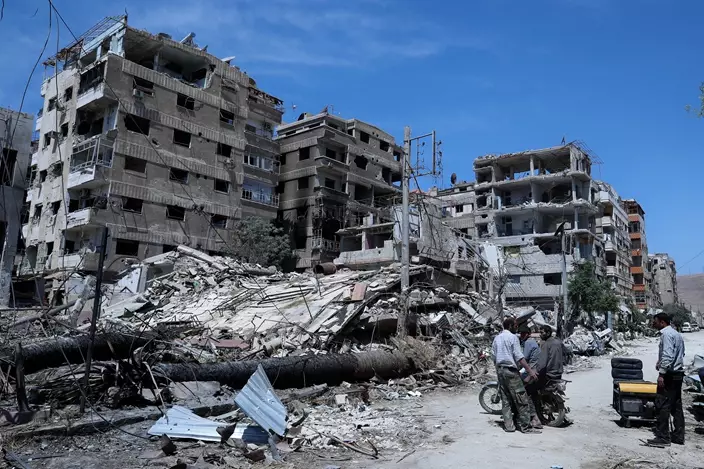
People stand in front of damaged buildings, in the town of Douma, the site of a suspected chemical weapons attack, near Damascus, Syria, Monday, April 16, 2018. (AP Photo/Hassan Ammar)
Residents also spoke of several local families who used to buy large amounts of food and hoard it to sell later at a far higher price, making most food products out of reach for most people.
Wafaa al-Seikh, 60, spoke wistfully of a time, years ago, when she used to cook a different dish for her family of six children and have a shower every day. For the past year, she said she could not afford to pay for staples like sugar, which shot up to 18,000 Syrian pounds ($40) a kilogram (2.2 pounds), from its normal price of 500 Syrian pounds (about $1.10).
"A month could pass without having a shower," said the woman, who had rice for the first time in years on Sunday. She described the past two months during the army's offensive to capture Douma as terrifying, with time passing slowly in shelters with little food and lice spreading among residents.
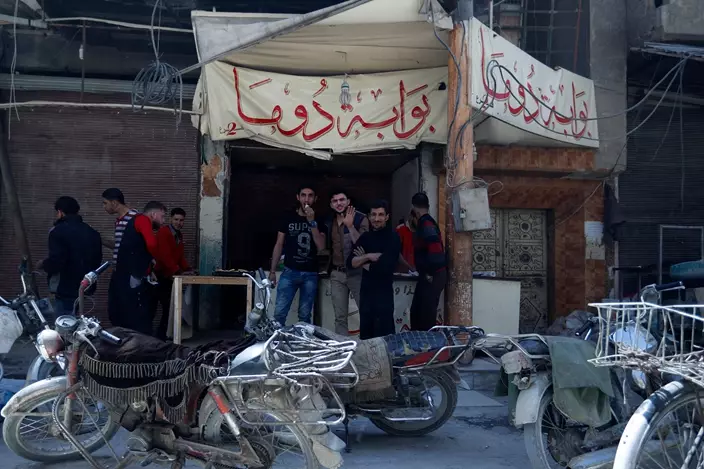
Syrians have their breakfast at a restaurant called Douma gate in the town of Douma, the site of a suspected chemical weapons attack, near Damascus, Syria, Monday, April 16, 2018. (AP Photo/Hassan Ammar)
Douma was the scene of a suspected chemical weapons attack on April 7 that killed more than 40 people and hastened the rebels' surrender to government forces. During a government-organized trip Monday, survivors spoke to the AP of the horror they witnessed from a chlorine-like substance that killed their neighbors, but they blamed the rebels for the attack, without providing any evidence.
The Assad government was working on winning the hearts and minds of Douma residents, handing out the free food Monday and pledging to restore services in a timely fashion.
At a meeting on Monday attended by Syrian Finance Minister Maamoun Hamdan, several local bankers and a number of Douma dignitaries, Hamdan promised that services would start improving in coming weeks and mobile bakeries would be deployed in neighborhoods to sell bread, the country's main staple, at cost.
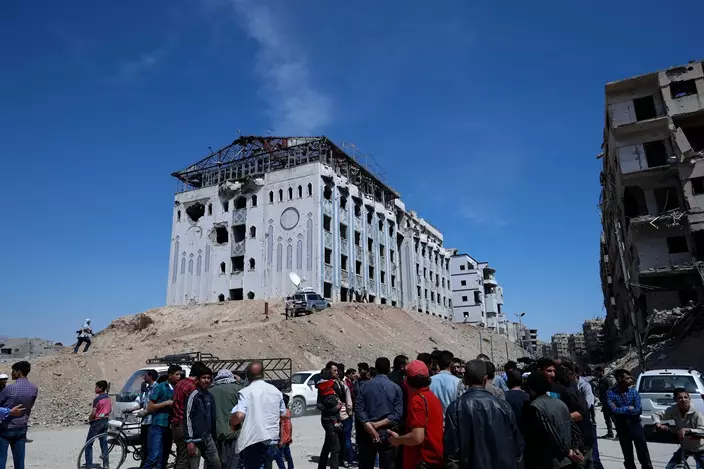
In this Monday, April 16, 2018 photo, people gather in front of a hospital that locals referred as Point One, left, just meters away from where the alleged chemical weapons attack occurred in the town of Douma, the site of a suspected chemical weapons attack, near Damascus, Syria. (AP Photo/Hassan Ammar)
Hamdan said that initial funding of 5 billion Syrian pounds ($10.8 million) had been set aside "for different domains, and if it is not enough then we are ready to fund more."
Maj. Gen. Issam Shehadeh Al-Hallaj, the chief police commander in the region, said that security forces were manning 15 checkpoints set up outside town to secure public properties and maintain order. He said 60,000 residents remained in the town after tens of thousands of rebels and their families left for rebel-held areas in northern Syria over the past two weeks. "We have deployed patrolling forces in all the squares to save the citizens and to spread security," he said.
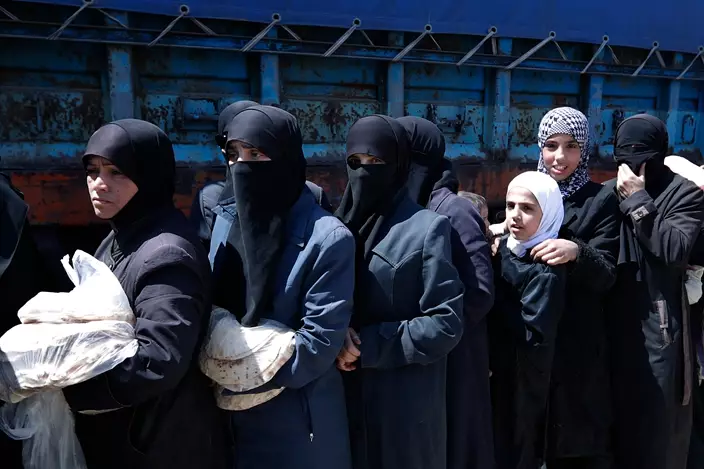
Syrian women wait for Syrian authorities distributing bread, vegetables and pasta to Douma residents, in the town of Douma, the site of a suspected chemical weapons attack, near Damascus, Syria, Monday, April 16, 2018. (AP Photo/Hassan Ammar)
BEIRUT (AP) — Amnesty International said Wednesday it has documented widespread abuses, including torture and deprivation of medical care, in detention facilities holding thousands of suspected Islamic State members and their relatives in northeast Syria.
The centers and camps hold about 56,000 people — the majority of them children and teens — and are run by local authorities affiliated with the U.S.-backed, Kurdish-led Syrian Democratic Forces. The SDF and its allies, including U.S.-led coalition forces, defeated the Islamic State group in Syria in 2019, ending its self-proclaimed Islamic “caliphate” that had ruled over a large swath of territory straddling Iraq and Syria.
What to do with the suspected IS fighters and their families has become an intractable issue. Many countries whose citizens traveled to Syria to join IS have been reluctant to repatriate them, as have local communities in Syria.
"People held in this system are facing large-scale violations of their rights, some of which amount to war crimes,” Nicolette Waldman, Amnesty’s senior crisis advisor, told journalists.
The United States is also responsible for the alleged violations because it played a key role in establishing and maintaining the detention system, providing hundreds of millions of dollars to the SDF and affiliated forces and regularly interrogating detainees, Waldman said.
The human rights group interviewed 126 people accused of IS affiliation currently or formerly detained, along with representatives of the local administration and aid workers.
The Amnesty report said the vast majority of detainees are being held “indefinitely, without charge or trial, in violation of international human rights law and international humanitarian law,” while those who have been tried were, in many cases, convicted on the basis of confessions extracted under torture.
The alleged abuses include “beating, stress positions, drowning, electric shocks and gender-based violence,” including a male detainee who said he and others had been sodomized with broomsticks by guards, the report said. Detainees were also deprived of food, water and medical care and subjected to extreme cold and heat in overcrowded cells, with some allegedly dying of suffocation, it said.
The report added that many of the approximately 14,500 women and 30,000 children held had been victims of human trafficking, including women who were forced to marry IS fighters and minors who were forcibly recruited by the group, and that local authorities had failed to set up a “mechanism to identify trafficking victims” and protect them.
The report also criticized the practice of forcibly separating adolescent boys — some as young as 11 or 12 — from their mothers and placing them in rehabilitation centers indefinitely.
Amnesty called on local authorities, the U.S. government and other allies to bring the detention system into compliance with international law and urged the United Nations to work with them to establish a screening process to release all who are not “reasonably suspected” of having committed a serious crime.
The Autonomous Authorities of the North and East Syria Region, the civilian administration affiliated with the SDF, wrote in response to the Amnesty findings that it had not received any official complaints regarding torture in detention facilities and “if this happened, they are individual acts.”
The administration said it would take action against employees who committed violations if evidence is provided. It denied allegations that inmates were deprived of food, water and medical care. It acknowledged overcrowding in the facilities, which it attributed to lack of financial resources to secure larger centers.
The local authorities took issue with the allegation that people were arbitrarily detained, asserting that most detainees “are members of a terrorist organization and were arrested during the battles" and that many had committed crimes against humanity and war crimes.
The U.S. State Department said in its own response that “we share many of (Amnesty’s) concerns” and it has been working to address them. It called on the international community to “aid local entities’ management of these challenges” and for countries with citizens held in detention in Syria to repatriate them.
Waldman said she believes Washington "very likely knew about these poor conditions from the beginning."
She added: “We think that it may not be the case that they are doing everything they can. They need to accept a much greater responsibility, especially since they played such a key role in establishing the situation in the first place."
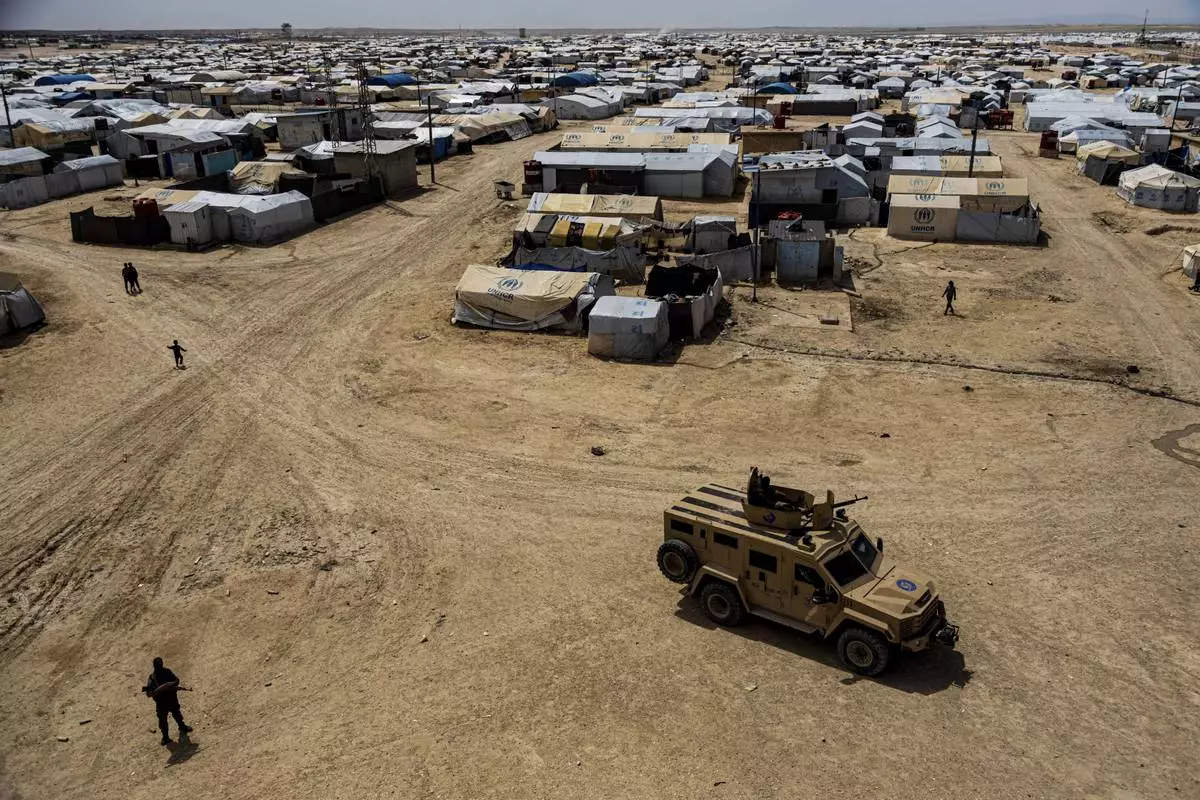
FILE - Kurdish forces patrol al-Hol camp, which houses families of members of the Islamic State group in Hasakeh province, Syria, on April 19, 2023. Amnesty International said Wednesday, April 17, 2024 it has documented widespread abuses, including torture and deprivation of medical care, in detention facilities holding thousands of suspected Islamic State members and their relatives in northeast Syria. (AP Photo/Baderkhan Ahmad, File)
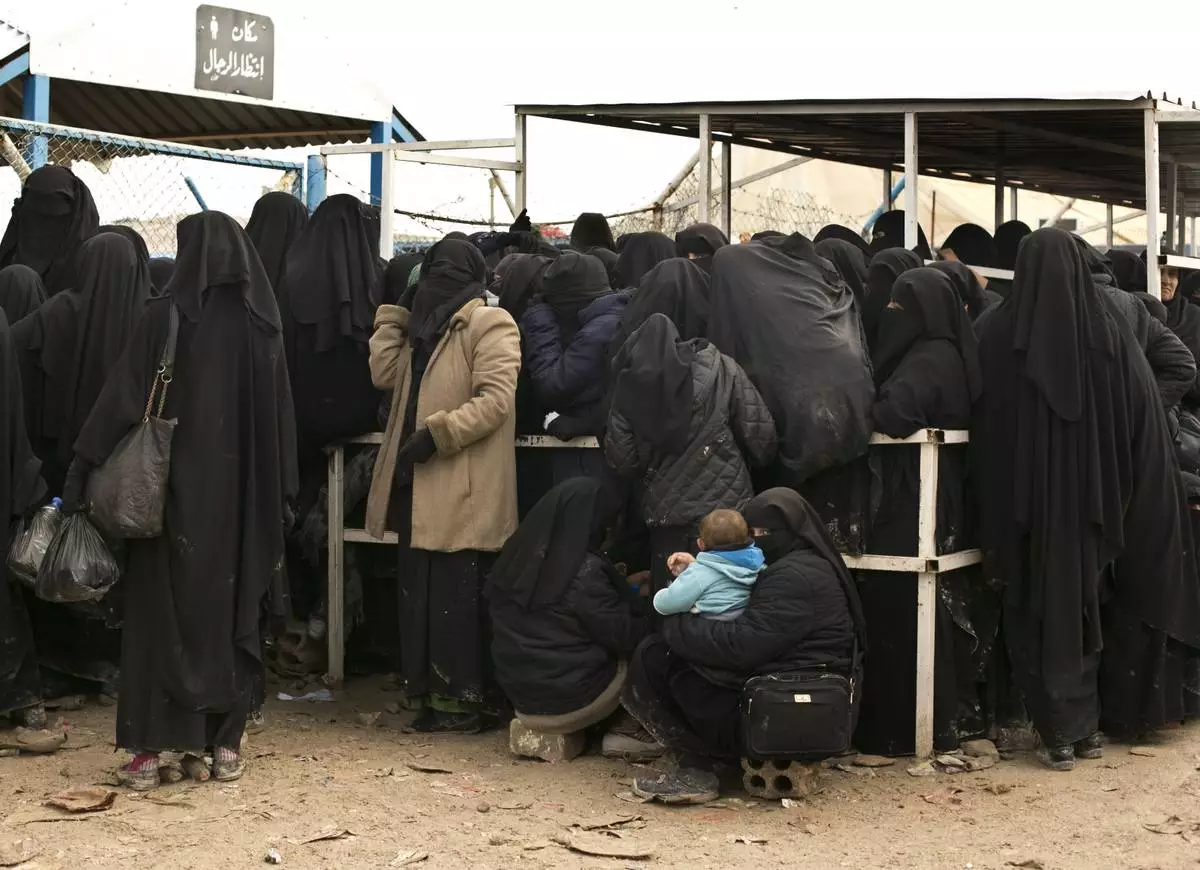
FILE - Women residents from former Islamic State-held areas in Syria line up for aid supplies at Al-Hol camp in Hassakeh province, Syria, March 31, 2019. Amnesty International said Wednesday, April 17, 2024 it has documented widespread abuses, including torture and deprivation of medical care, in detention facilities holding thousands of suspected Islamic State members and their relatives in northeast Syria. (AP Photo/Maya Alleruzzo, File)















